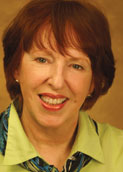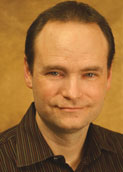Editor's Notebook
The Myth of Multitasking

There are a few new features in this issue, including, finally, an updated photo of the editor. We're working towards a redesign of the magazine and although that's some time away, we have noted complaints that the body type was too small. Squinters, rejoice! We've tried a clearer font in a larger size. This may not be the final type style, but should make reading easier in the meantime.
The other face you see is that of Daniel McCabe, BA'89, who has taken over the job of associate editor. Daniel's byline has appeared in these pages for some time. In fact, he has won national awards for features he's written for the News, and his stories have appeared in Saturday Night and Elle Canada magazines. You may even have heard his words before. As a senior communications officer, Daniel also crafted elegant speeches for McGill notables to deliver at Homecoming and branch events. We're delighted he's joined us.

Our cover article is about two people who recently made big news on campus, adding their names to the panoply of McGill benefactors. Further on, there's a story about people on campus who have made news on the world stage, attracting widespread media attention in 2005 thanks to their research or other achievements.
Another frequent media favourite is McGill neuroscientist Robert Zatorre, whose studies of how and where the brain processes language and music have long intrigued reporters. His latest findings, with graduate student Jennifer Johnson, certainly piqued my interest. Through a study of MRI scans the pair found that a part of the brain "lights up" when processing different streams of sensory information simultaneously.
Once it was thought that the brain took care of aural and visual chores in discrete areas, but Zatorre and Johnson found that a region in the frontal lobe seems to coordinate activities, allowing us to multitask - talk on the phone while driving, for instance. Any driver who has been cut off by an oblivious cell phone user won't be surprised to hear that attention shifts between activities, and that greater focus on one reduces the brain's attention on the other.
Originally coined to describe computer processing, the term "multitasking" may be inaptly applied to humans. That's certainly the view of entrepreneur and technologist Stever Robbins, who in a recent Currents magazine article says, "Multitasking is a chance to accomplish many things poorly, all at once."
He adds that cell phones and BlackBerries increase expectations of greater efficiency, but in fact cause people to be overwhelmed because there is no downtime. Robbins, who trains business executives, espouses the "just enough" approach - deciding what we can realistically accomplish, given limited energy, time and attention. He urges people to take the vacations they are due (25% of Canadians and 31% of Americans apparently don't), and when on holiday, to unwind, unplug and "never, ever call the office." His final advice is the simplest, and probably the hardest - say no. Say what?
Many readers will recall dispatches from grads Tara Newell, BA'98, and James Caddell, BA'97, who were on a two-year trek around the world. In the spring 2005 issue they described how they had interrupted their journey for several months to work in an area of India affected by the tsunami. Shocking news came in October, when we learned that James had died in Bolivia from the effects of altitude sickness.
Tara said in an interview shortly after his death that their time in India "changed everything for us." The Canadian Relief Foundation had put them in charge of its activities in Tamil Nadu, and they were soon helping 1,200 orphans and underprivileged children in nine orphanages.
Tara told the Globe and Mail that "James wanted to come home and be a business success, so he could spend all of his money on charity and support children around the world." To read more about this remarkable young man and the scholarship for orphans founded in his name, see www.canadianrelief.ca/james_caddell_scholarship.shtml.


